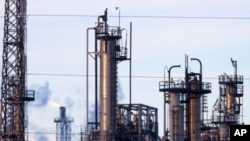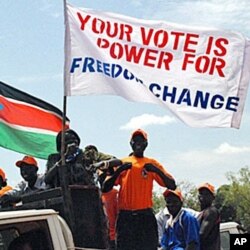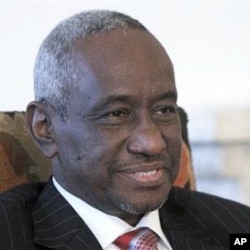The US–backed 2005 Comprehensive Peace Agreement (CPA) brought an end to the civil war in Sudan… but the threat of a return to conflict remains close because of the huge oil reserves, mostly located in the south, which fuels Sudan's economy.
Sudan's ruling National Congress Party has always denied there is a link between the CPA and oil. Recently the foreign minister of Sudan Ali Karti said the intention in signing the CPA was to end the war, and nothing more.
Khartoum has changed a lot since the war ended. Peace has boosted oil production to a half million barrels a day. The new prosperity is easily visible on the streets of the Sudanese capital. Skyscrapers are being built, new bridges constructed, fancy cars cruise the city, and foreign bank accounts are available and popular.
Hafiz Mohammed, an analyst based in Khartoum, thinks that oil revenue sharing is a key part of the CPA.
"I think the oil is one of the main factors which actually influence the whole CPA or the comprehensive peace agreement, because it is the main source of income for the north and south," says Mohammed.
"The north has other resources but the oil is still a major factor, that is why they have the wealth sharing protocol which addresses the issue of how to divide the proceeds of the oil sale," Mohammed explains.
The south is expected to ovewhelmingly vote for seperation from the north in January's referendum. According to Mohammed, secession could have a very severe impact on the north’s economy,
He says the north is going to face problems, there is no way of denying that. "The north," he says, " is going to loose at least 50% of its income which in turn will affect the foreign currency proceeds which in turn will affect the value of the currency (the sudanese pound) which will then have a devastating impact on Sudan generally."
Another analyst, Alhajj Hamad, blames the government for putting the oil money in the pockets of officials and not preparing the country for the likelihood that the south might decide to secede. The citizens of the north never had a share in the oil revenue, the oil proceeds directly went into the coffers of the government to expand security and the military apparatus. Hamad says, "in the last six years 35% of the annual budget was for security and defence."
The vice-presidents of the north and south, Ali Osman Taha and Riak Machar, agreed last month to jointly guard the oil fields before and after the refrendum to help guarantee oil revenues. Hamad says there are plans in place to hand over the control of the oil fields from the north to the south.
"It is very clear that in the post referendum period, there is one initiative by the current Minister of Energy in which he has suggested a slow paced handover for the south. As you know on the referundum vote, it is mostly expected the south will go for a separation. Then six months after the referendum they are supposed to have a kind of an action plan for a handover," explains Hasmad.
The agreement of the two vice presidents might be the first step to find a solution to both sides' problems. They depend on each other: the north doesn’t have oil and the south doesn’t have pipelines to export the oil.
Some northerners are not worried about the south’s secession. As president Omar Bashir pointed out recently, the effect of the seperation would be minimal.
Umeima Ahmed, an NCP member of parliament, says proudly that the north lived without oil before and can again.
" We were managing [before the discovery of oil]. Now, we will [have to] look for other alternatives: we have gold and vast lands with water to farm on, let the south have their oil," Ahmed asserts.
The north has expanded its farming sector and currently is exploring for more oil in the western region of Darfur. According to Hamad, oil means more political problems in a nation already suffering because of oil.
She says, "already in the oil fields of South Darfur, there is production of 30, 000 barrels a day. Surely, we should not feel happy because of the experience of the south. With oil there is more political instability, and now with 30,000 barrels in Bileil in South Darfur simply means 30,000 political problems," she says.
The senior member of NCP and the head of the energy committee in the national assembly, Mohammed Abdallah Musa, says oil production in the north will double.
"Our aim in the coming period is to expand our exploration, " Musa says " because we don’t want more troubles connected oil. We are satisfied, and ready to accept having a new neighboring nation."
Whether that will remain true once southern oil revenues dry up is one of the big question marks hanging over the outcome of the referendum, and the end of the CPA.






